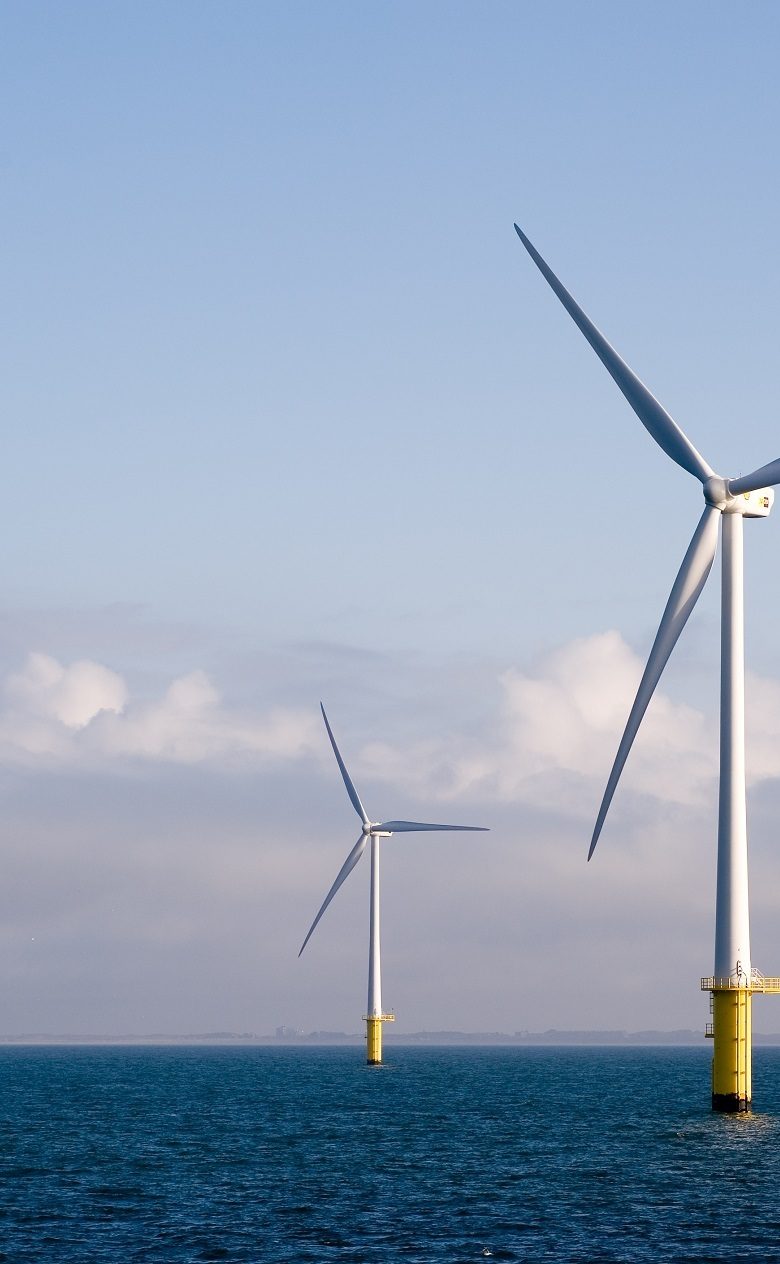Offshore wind energy
The challenges for offshore wind energy lie in scaling up, ecological impact and multifunctional use. Deltares collaborates with industry and other knowledge institutions on research and advice on ecological and technical aspects, such as hydrodynamics, geology, foundations, cables, corrosion and impact on the ecosystem.

Whether or not a (large-scale) offshore wind farm is built and under what conditions? And if so, where can this be, how much can it be and how does it stand in relation to the limited space available in the North Sea? What is the impact of a wind farm on ecology? Can a wind farm enrich nature? And how can we keep the costs of the ever-increasing wind turbines as low as possible without compromising the safety and reliability of the foundations associated with extreme waves and currents?
Deltares supports policymakers at governments and developers of offshore wind farms with these and more pressing questions. We do this globally and in different phases of wind farm development and at different levels of detail. From system scale, such as the impact on the ecosystem through large-scale wind farm development to detailed engineering, such as the effects of extreme waves on the foundation.
The challenges for offshore wind in the coming years are scaling up the number of wind farms to be built, the ecological impact and the multifunctional use. There we offer added value for clients and developers and together we can make the difference.
Yorick Broekema, offshore wind expert
Deltares works closely with industry in both advice and research as part of, for example, the GROW consortium and TKI-Wind op Zee (part of the Dutch Top Sector Energy). With its knowledge of water and subsoil, Deltares contributes to the development and realisation of innovations for current and planned wind farms. For instance, Deltares helped wind farm managers based on predictions whether or not they could go out for maintenance. We supported the development of cheaper foundations and Deltares developed methods to model both pile installation and horizontal loads.
Whereas initially the focus was on cost reduction to make offshore wind energy affordable, estimating and reducing the impact of wind farms on ecology are increasingly higher on the agenda. This also applies to Deltares. Where we see opportunities for sustainability, we go for it. Think of both enabling more silent installation methods, facilitating nature-inclusive design of foundations and sustainable decommissioning of the foundation at the end of its life span.
Integrated approach through expertise from various disciplines
Deltares plays a role in the various phases – from decision making to wind farm design and construction – because we can offer expertise from a variety of disciplines. We link geological, geotechnical, hydrodynamic, morphological and ecological knowledge with socio-economic issues concerning spatial planning and the creation of support among stakeholders. We can thus contribute to the development of wind farms on both a system-scale and a very high level of detail.
For wind farms that are installed offshore, we conduct research in several phases during the design process to determine the hydrodynamic conditions under which they can be built. These conditions are different for each location, so this must always be carefully examined. We carry out extensive tests in our own testing facilities to model the processes related to hydraulics and seabed, such as foundation soil and how to protect against it. ’s addition, we conduct research and advise the parties to reduce the risk of damage to cables and piping and thus reduce costs. We examine the effects of flow and waves on innovative concepts such as the integration of nature-including design concepts in the design of the foundation. Together with industry, but also with other knowledge institutes and universities, we actively think about how we can achieve and strengthen the intended effects.
The tests in our own research facilities (laboratories) and numerical modeling make it possible for clients with advice and research to improve the placement, operation and efficiency of wind turbines. This also offers the industry the opportunity to introduce innovations, such as using other types of foundation such as jackets, Gravity-based-structures (GBS), tripods, suction piles and even floating foundations for deeper waters. Or new techniques to remove monopiles from the seabed at the end of its lifespan by means of water pressure, so that the steel can be re-used and circular building is stimulated.
Offshore engineering: from wave loads, subsurface strength to corrosion of infrastructure
Offshore wind farms are hydrodynamically stressed and the seabed is dynamic. To optimise design, installation, management and maintenance, we help our clients answer questions related to hydrodynamics, morphology and geology. To do so, we use, among other things, simple in-house developed tools, scale tests, detailed computer models and actual observations from wind farms when available. We do research and advise on:
- Metocean/environmental conditions: wind, waves, currents, water levels
- Operational real-time forecasting systems for installation and O&M
- Wave loads and impacts on foundations and floating installations
- Scour and scour protection for all types of foundations
- Bedlevel changes due to morphodynamics (e.g. sand waves)
- Hydrodynamic loads on cables and cable protection systems (CPS)
- Cable routing and site selection in morphodynamic areas
- Geological assessments and seabed characterisation
The ever-increasing size of turbines and foundations places great demands on the strength and load on the subsurface. In addition, it is necessary to minimise the impact of large-scale roll-out of offshore wind farms on marine life wherever possible. More silent installation methods and mitigating noise measures are also needed to increase the time window in which construction can take place and realise all intended wind farms. Deltares is researching this in collaboration with the offshore wind industry. Geotechnical questions we answer for our clients are questions on:
- Geotechnical assessment and testing of design of foundations including behaviour of soil by cyclic liquefaction and deformation
- Proof of concept, testing and optimisation of innovative and silent pile installation techniques
- Decommissioning techniques of monopiles for reuse
- Cable burial techniques (jetting, ploughing, trenching, self burial, HDD drilling)
- Cable protection at anchors, fishing nets and other objects
Corrosion of cables and foundations play a major role in the cost of management and maintenance of offshore wind farms. Deltares conducts research on corrosion and biochemistry and helps clients with questions on:
- Microbiologically influenced corrosion (MIC)
- Effectiveness of cathodic protection (CP) and coatings
- Effects of environmental conditions (e.g. jets, pH balance with replenishement)
Ecology and offshore wind
Offshore wind energy contributes to achieving sustainable energy, but it is also clear that building in the natural environment can have major ecological effects. In the WOZEP project (Wind at Sea Ecological Programme), Deltares is working with other parties to develop ecosystem knowledge and modelling tools to assess ecosystem effects. These are effects on water stratification, currents and sand suspension, which in turn affect primary and secondary production of nutrients for marine life. Installing a single pole will have limited effects, but large-scale development of offshore wind farms in the North Sea and elsewhere in the world can have a major impact on the ecosystem. WOZEP is conducted in cooperation with Rijkswaterstaat, the Ministry of Economic Affairs and Climate, Wageningen Marine Research, NIOZ, engineering firms and the offshore wind sector. We make the knowledge and results gained publicly available. This information can be used to assess the impact of offshore wind farms on protected species. The research in WOZEP is closely linked to the Dutch Monitoring Research-Nature Enhancement-Species Protection (MONS) programme, which aims to answer the central question of whether and how the changing use of the North Sea fits within the ecological carrying capacity of the North Sea.
Ecological studies carried out by Deltares for clients are:
- Environmental impact assessments
- Study of emissions from the offshore wind industry
- Cascading effects of large-scale offshore wind farm development
- Development of nature-inclusive foundation design
Future perspective: offshore wind farms and other applications
How can you get the most out of the area you allocate to generating offshore wind energy and where space is limited? It is a key question and the reason why Deltares also focuses on combining as many functions as possible in offshore wind farms, and is conducting research into this. Other possible applications include aquaculture, floating solar parks or energy countries where the wind energy generated can also be converted to green hydrogen and stored for later use, if, for example, there is no wind for once. This integration into the entire energy system is going to play a crucial role in the entire energy transition. To answer these questions, we are also deploying our marine spatial planning knowledge and approach. Thinking about marine spatial planning is necessary to protect the various functions, pressures on space and the well-being and functioning of the ecosystem. This requires a multidisciplinary approach and close cooperation between different sectors.




